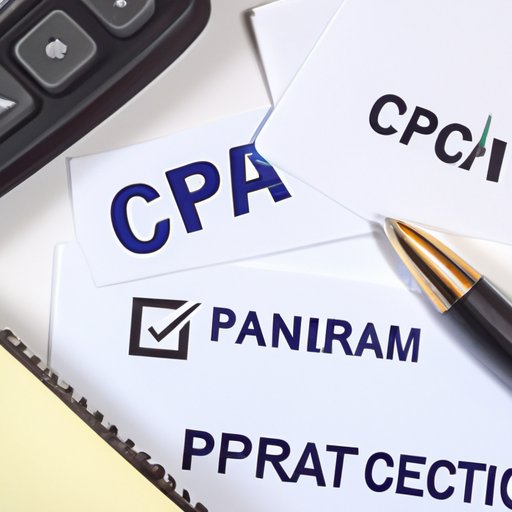I. Introduction
Are you interested in a career in accounting? If so, becoming a Certified Public Accountant (CPA) is a great option. CPAs are in high demand and can work in a variety of industries, including public accounting, corporate accounting, and government accounting. In this guide, we will provide you with a step-by-step guide to becoming a CPA, including eligibility requirements, exam preparation tips, obtaining credentials and licenses, personal experiences from current CPAs, insights into the industry, and helpful resources and tools.
II. Step-by-Step Guide
A. Eligibility Requirements
Before you can begin preparing for the CPA exam, you must meet the eligibility requirements. These requirements vary by state but typically include educational and experience requirements.
1. Educational Requirements
To be eligible to sit for the CPA exam, you must have a minimum of a bachelor’s degree in accounting or a related field. Some states may require additional coursework in specific areas, such as auditing or taxation.
2. Experience Requirements
Most states require individuals to have some work experience in accounting before they can become licensed. This usually involves working for a certain number of hours under the supervision of a licensed CPA.
B. Exam Preparation and Tips
Once you meet the eligibility requirements, it’s time to prepare for the CPA exam. The exam consists of four sections: Auditing and Attestation (AUD), Business Environment and Concepts (BEC), Financial Accounting and Reporting (FAR), and Regulation (REG). Here are some tips to help you prepare:
1. Study Materials
There are a variety of study materials available to help you prepare for the exam, including textbooks, online courses, and review courses. It’s important to find materials that work best for you and your learning style.
2. Test-Taking Strategies
When it comes time to take the exam, there are several strategies you can use to increase your chances of success. One of the most important is to manage your time wisely. You will have a limited amount of time to complete each section, so it’s important to pace yourself. Additionally, make sure to read each question carefully and answer all parts of the question.
C. Obtaining Credentials and Licenses
Once you pass the CPA exam, you will need to obtain the necessary credentials and licenses. This typically involves an application process and fulfilling continuing education requirements.
1. Application Process
The application process varies by state but usually involves submitting an application and paying a fee. You may also need to provide documentation of your education and work experience.
2. Continuing Education Requirements
After you become licensed, you will need to fulfill continuing education requirements to maintain your license. This typically involves completing a certain number of hours of continuing education each year.
III. Personal Experiences
A. Introduction to the CPA Sharing Their Story
To provide some insight into what it’s like to become a CPA, we spoke with a current CPA about their experiences.
B. Insights and Lessons Learned During the Journey to Become a CPA
The CPA we spoke with emphasized the importance of not getting discouraged when faced with challenges. They also stressed the value of networking and building relationships in the industry.
C. Tips and Suggestions for Aspiring CPAs
Some of the tips provided by the CPA we spoke with included finding a mentor, developing a strong work ethic, and taking advantage of the resources available to you.
IV. Interview with a CPA
A. Introduction to the CPA Being Interviewed
In addition to our personal experiences section, we spoke with another CPA to gain additional insights into the profession.
B. Questions about Their Experience and Journey to Becoming Licensed
We asked the CPA about their experience preparing for the exam, obtaining their license, and starting their career.
C. Struggles, Successes, and Tips for Aspiring CPAs
The CPA we spoke with shared some of their struggles, successes, and tips for aspiring CPAs. They emphasized the importance of hard work, dedication, and never giving up on your goals.
V. Industry Insights
A. The Current State of the Accounting Industry
The accounting industry is constantly evolving, and it’s important to stay up-to-date on the latest trends and developments.
B. The Demand for CPAs
There is a high demand for CPAs in a variety of industries. Many companies rely on CPAs to provide expertise in accounting and financial reporting.
C. Potential Career Paths and Opportunities Available
CPAs can work in a variety of industries and have many career paths available to them. Some examples include public accounting, corporate accounting, and government accounting.
VI. Resources and Tools
A. Introduction to Useful Resources and Tools
There are many resources and tools available to help individuals prepare for the CPA exam and advance their careers.
B. Links to Helpful Websites
Websites such as the American Institute of Certified Public Accountants and the National Association of State Boards of Accountancy offer a wealth of information and resources for aspiring CPAs.
C. Study Guides and Test-Taking Tips
There are many study guides and test-taking tips available to help individuals prepare for the CPA exam. Some examples include review courses, flashcards, and study groups.
VII. Conclusion
A. Recap of the Topics Covered
Throughout this guide, we provided a step-by-step guide to becoming a CPA, personal experiences, insights into the industry, and resources and tools to help you succeed.
B. Final Thoughts on the Importance of Becoming a CPA
Becoming a CPA is a great way to advance your career in accounting and open up many opportunities for growth and success.
C. Encouragement to Pursue a Career in Accounting
If you are interested in pursuing a career in accounting, we encourage you to take the first step towards becoming a CPA and begin exploring the many opportunities available in the field.
